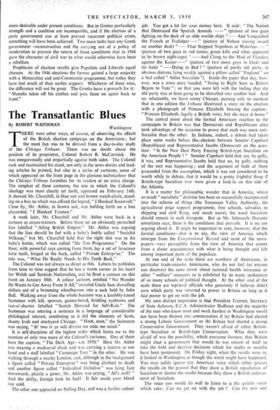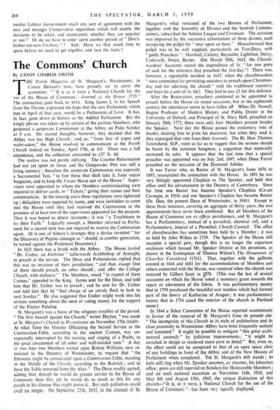The Transatlantic Blues
By ROBERT WAITHMAN Washington A week later, Mr. Churchill and Mr. Attlee were back in a cartoon as circus-trainers. Before them sat an obviously perturbed lion labelled "Ailing British Empire." Mr. Attlee was arguing that the lion should be fed with a baby's bottle called "Socialist Milksop," but Mr. Churchill held that the right diet was in his baby's bottle, which was called "Me Too Programme." On the floor, with powerful rays coming from them, lay a set of ferocious false teeth, hinged at the back, called "Private Enterprise." The title was, "What He Really Needs Is His Teeth Back."
The Colonel was not always as direct as this. Letters he publishes from time to time suggest that he has a warm corner in his heart for Welsh and Scottish Nationalistsi and he fired a cannon on this front on January 30th. A colour cartoon, entitled "No Wonder He Wants to Get Away From It All," revealed Uncle Sam shovelling dollars out of a brimming wheelbarrow into a sack held by John Bull. Walking away from the whole business was a knobbly-kneed Scotsman with kilt, sporran, goatee-beard, bristling eyebrows and tam-o'-shanter labelled "Scotch Demand for Self-Rule." The Scotsman was uttering a sentence in a language of considerable philological interest, combining as it did the elements of Scots, shanty Irish and stockyard Chicago. "Hoot, mon," the Scotsman was saying, " th' two iv ye will drrrive me outa me mind."
It is self-discipline of the highest order which limits me to the mention of only two more of the Colonel's cartoons. One of them bore the caption, "The Dark Age—A.D. 1950." Here Mr. Attlee was wearing a mediaeval cloak and was carrying a lantern in one hand and a staff labelled "Campaign Tour" in the other. He was walking through a murky London, and, although in the background a figure called "Private Enterprise" was being clubbed to death and another figure called "Individual Initiative" was lying face downwards, plainly a goner, Mr. Attlee was crying, "All's well! " And the shifty, foreign look he had! It fair made your blood run cold.
The other one appeared on Polling Day, and was a further colour job. You got a lot for your money here. It said: "The Nation that Destroyed the Spanish Armada —" (picture of two guys
fighting on the deck of an olde worlde ship) " And Vanquished the French at Trafalgar—" (picture of Nelson waving sword on another deck) " That Stopped Napoleon at Waterloo—" (picture of two guys in red tunics, green kilts and what appeared to be brown night-caps) "—And Clung to the Mud of Flanders against the Kaiser—" (picture of two more guys in khaki and tin -hats) " Dying in Bed ? " (picture of portly old party, in obvious distress, lying weakly against a pillow called " England " on a bed called "Attlee Socialism "). Inside the paper that day, how- ever, was a news story headed, "Swing to Right Seen as Britain Begins to Vote " ; so that you were left with the feeling that the old party was at least going to be shovelled into another bed. And so, reluctantly, we leave sunny Chicago, pausing only to mention that in one edition the Tribune illustrated a story on the election with a photograph of Princess Elizabeth bearing the caption : "Princess Elizabeth, legally a British voter, but she stays at home."
The central point about the formal American reaction to the campaigns in Britain was that Democrats and Republicans alike took advantage of the occasion to prove that each was more anti- Socialist than the other. In Indiana, indeed, a debate had taken place some weeks before the. election between Senator Capehart (Republican) and Representative Jacobs (Democrat) on the ques- tion: "Is the New Deal Party Forcing British-type Socialism on the American People ? " Senator Capehart held that yes, by golly, it was, and Representative Jacobs held that no, by golly, nothing of the sort was happening ; and the argument of both of them proceeded from the assumption, which it was not considered to be worth while to debate, that it would be a pretty frightful thing if British-type Socialism ever were given a look-in on this side of the Atlantic.
It is a matter for philosophic wonder that in America, where so much " socialistic " doctrine has been so successfully incorporated into the scheme of things (the Tennessee Valley Authority, the agricultural price support programme, free schools, subsidies to shipping and civil flying, and much more), the word Socialism should remain in such disrepute. But as Mr. Schnozzle Durante sometimes says, them is the conditions that prevails. It is no use arguing about it. It might be important to note, however, that the formal conditions—that is to say, the view of America which emerges from the Congressional Record and most of the news- papers—vary perceptibly from the view of America that comes from a closer acquaintance with what is being thought and felt among important parts of the populace.
At one end of the scale there are numbers of Americans, in particular trade-unionist Americans, who do not feel (as anyone can discover) the same terror about national health insurance or other "welfare" measures as is exhibited by so many spokesmen of so many schools of political thought. At the other end of the scale there are top-level officials who genuinely (I believe) didn't care which party was returned to power in Britain so long as it had power to get on with the job.
My own distinct impression is that President Truman, Secretary• of State Acheson, E.C.A. Administrator Hoffman and the majority of the men who know most and work hardest in Washington would not have been thrown into consternation if (a) Britain had elected a strong Labour Government or (b) Britain had elected a strong Conservative Government. They weren't afraid of either British- type Socialism or British-type Conservatism. What they were afraid of was the possibility, which everyone foresaw, that Britain might elect a government that would be too unsure of itself to take the bold and decisive decisions which for weeks or months have been postponed. On Friday night, when the results were in, it looked in Washington as though the worst might have happened. You may safely ignore any American voice which either praises the results on the ground that they show a British repudiation of Socialism or damns the results because they show a British endorse- ment of Socialism.
The voice you would do well to listen to is the quieter voice which asks: Can we get on with the job ? Can the new and weaker Labour Government reach any sort of agreement with the new and stronger Conservative opposition which will enable the decisions to be taken, and maintained, whether they are popular or not ? Or do we have to enter upon another period of " Don't- bother-me-now-I'm-busy " ? And : Have we that much time to spare before we need to get together and face the facts ?



































 Previous page
Previous page